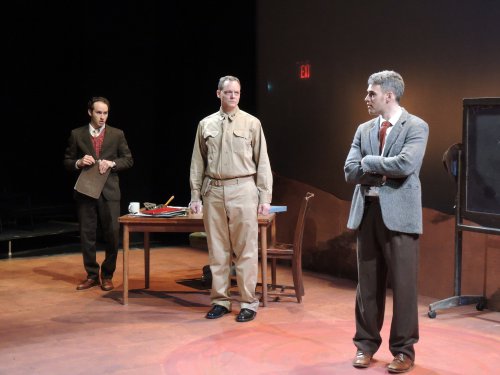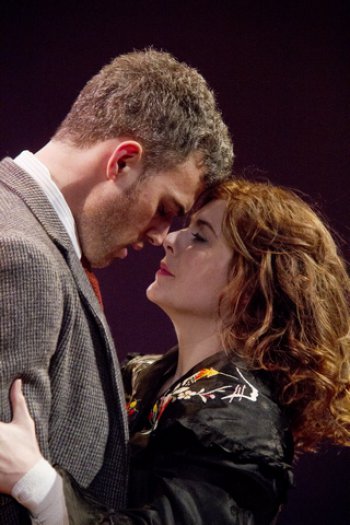Irreversible
The premiere of Jack Karp’s new play about physicist Robert Oppenheimer is a well-written and an engaging theater experience about ambition and conscience.

Josh Doucette, Hugh Sinclair and Jordan Kaplan in a scene from “Irreversible” (Photo credit: Red Fern)
[avatar user=”Stefan Woych” size=”96″ align=”left” ] Stefan Woych, Critic[/avatar] In July 1945, the first atomic bomb, as a test, was detonated in New Mexico. Physicist J. Robert Oppenheimer was the director of the Los Alamos National Laboratory that designed the bomb. When the degree of damage was studied, some of the researchers, including Oppenheimer’s younger brother Frank, had second thoughts about dropping one on Japan. Jack Karp’s fascinating new play Irreversible, directed by Melanie Moyer Williams, follows Oppenheimer (Jordan Kaplan) from summer of 1944 to summer of 1945 while he struggles to balance his passion for the work, duty to complete the project, and his conscience.
Irreversible is well developed and easy to follow. The personal struggle between desire and conscience is illustrated in the plot as well as in each of Oppenheimer’s five relationships; his brother Frank (Josh Doucette), wife Kitty (Laura Pruden), ex-girlfriend Jean (Amelia Mathews), General Leslie Groves (Hugh Sinclair) and Danish physicist Niels Bohr (Dan Odell). Five people that represent the five issues at hand: ambition, conscience, passion, duty and reason. Karp interweaves Oppenheimer’s lectures into the story to explain the basics of physics and to remind us that he was a professor at Berkeley University. Karp adeptly denotes Oppenheimer’s dilemma between his passion and his conscience with clever wordplay in scenes where all five of his relations argue with him in tandem. They lucidly expose his relationship with each of them and to his conscience, moving the narrative along while reinforcing the theme.
On the whole, Williams sensitively stages Karp’s play with imagination and precision. Each character, and their relation to Oppenheimer, is clearly defined in regard to their particular polemic. Williams creates this differentiation visually. With Oppenheimer in the center, the five others stand at the different ends of the stage, like a five-pointed star, as they individually have their clashes with him. This defines each relationship and the five forces pulling on Oppenheimer. However, in their individual scenes with Oppenheimer, it is often one-note.
In the first scene between Robert and Frank, they are playing a game to see who can finish a mathematical equation first: a game between brothers. Frank refers to his older brother as “Oppie.” The scene has the makings to establish a 32-year history between the two. Unfortunately, there is no show of filial affection or rebellion, only awkward resistance, which remains the crux of their relationship throughout the play. It is unclear that they are brothers until the text tells us. Later on when the brothers are at odds, the bond that would make it all the more relevant is not there.
Overall, Kaplan gives a fine performance. Maintaining high energy and focus, he is attractive and intense as a driven Robert Oppenheimer and keeps the audience engaged. In a scene where Kitty seduces him on the couch, his eyes widen and an eager smile comes to his face, a competent actor, but that doesn’t carry over to other aspects of his performance. He gives a lecture, argues with his brother, and grapples with life and death issues all with the same gait and tone. Emotions are clearly all there to surface, but the actor stays in his comfort zone. Doucette is passionate as Frank, and clearly agonizes over disagreeing with his older brother. He is moving when their conflict rises and they comes to blows. Playwright Karp gives this role little color, and Doucette takes long pauses causing awkward cadences at times. The entire cast is believable and interesting to watch.
Andrew Mannion’s set serves the play well. The stage is divided between office and home. The floor is painted to suggest the explosion. A white scrim backdrop is used for silhouettes. The lighting by Marie Yokoyama along with sound by Andy Evan Cohen do an excellent job creating the explosion. Rebecca L. Welles’ costumes help define the characters and era.
The Red Fern Theater Production of Irreversible is an engaging night in the theater with excellent prospects.
Irreversible (through March 29, 2015)
The Red Fern Theatre Company
The Theater at the 14th Street Y, 344 East 14th Street between First and Second Avenues, in Manhattan
For tickets, call 212-352-3101 or visit http://www.theatermania.com
Running time: two hours and five minutes including one intermission
The premiere of Jack Karp’s new play about physicist J. Robert Oppenheimer is a well-written and an engaging theater experience about ambition and conscience.







Leave a comment